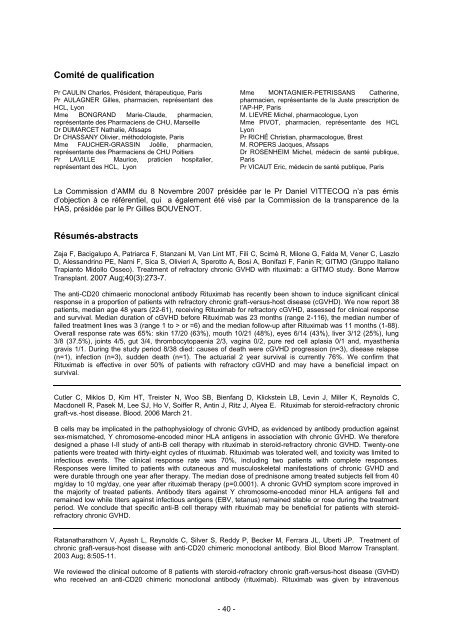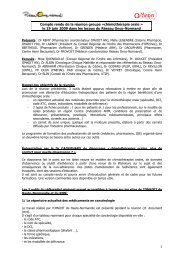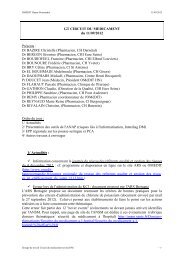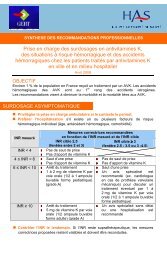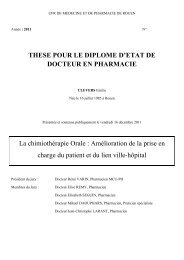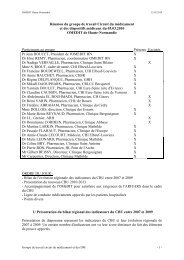RBU du Rituximab - OMéDIT de Haute-Normandie
RBU du Rituximab - OMéDIT de Haute-Normandie
RBU du Rituximab - OMéDIT de Haute-Normandie
Create successful ePaper yourself
Turn your PDF publications into a flip-book with our unique Google optimized e-Paper software.
Comité <strong>de</strong> qualification<br />
Pr CAULIN Charles, Prési<strong>de</strong>nt, thérapeutique, Paris<br />
Pr AULAGNER Gilles, pharmacien, représentant <strong>de</strong>s<br />
HCL, Lyon<br />
Mme BONGRAND Marie-Clau<strong>de</strong>, pharmacien,<br />
représentante <strong>de</strong>s Pharmaciens <strong>de</strong> CHU, Marseille<br />
Dr DUMARCET Nathalie, Afssaps<br />
Dr CHASSANY Olivier, méthodologiste, Paris<br />
Mme FAUCHER-GRASSIN Joëlle, pharmacien,<br />
représentante <strong>de</strong>s Pharmaciens <strong>de</strong> CHU Poitiers<br />
Pr LAVILLE Maurice, praticien hospitalier,<br />
représentant <strong>de</strong>s HCL, Lyon<br />
- 40 -<br />
Mme MONTAGNIER-PETRISSANS Catherine,<br />
pharmacien, représentante <strong>de</strong> la Juste prescription <strong>de</strong><br />
l’AP-HP, Paris<br />
M. LIEVRE Michel, pharmacologue, Lyon<br />
Mme PIVOT, pharmacien, représentante <strong>de</strong>s HCL<br />
Lyon<br />
Pr RICHÉ Christian, pharmacologue, Brest<br />
M. ROPERS Jacques, Afssaps<br />
Dr ROSENHEIM Michel, mé<strong>de</strong>cin <strong>de</strong> santé publique,<br />
Paris<br />
Pr VICAUT Eric, mé<strong>de</strong>cin <strong>de</strong> santé publique, Paris<br />
La Commission d’AMM <strong>du</strong> 8 Novembre 2007 présidée par le Pr Daniel VITTECOQ n’a pas émis<br />
d’objection à ce référentiel, qui a également été visé par la Commission <strong>de</strong> la transparence <strong>de</strong> la<br />
HAS, présidée par le Pr Gilles BOUVENOT.<br />
Résumés-abstracts<br />
Zaja F, Bacigalupo A, Patriarca F, Stanzani M, Van Lint MT, Filì C, Scimè R, Milone G, Falda M, Vener C, Laszlo<br />
D, Alessandrino PE, Narni F, Sica S, Olivieri A, Sperotto A, Bosi A, Bonifazi F, Fanin R; GITMO (Gruppo Italiano<br />
Trapianto Midollo Osseo). Treatment of refractory chronic GVHD with rituximab: a GITMO study. Bone Marrow<br />
Transplant. 2007 Aug;40(3):273-7.<br />
The anti-CD20 chimaeric monoclonal antibody <strong>Rituximab</strong> has recently been shown to in<strong>du</strong>ce significant clinical<br />
response in a proportion of patients with refractory chronic graft-versus-host disease (cGVHD). We now report 38<br />
patients, median age 48 years (22-61), receiving <strong>Rituximab</strong> for refractory cGVHD, assessed for clinical response<br />
and survival. Median <strong>du</strong>ration of cGVHD before <strong>Rituximab</strong> was 23 months (range 2-116), the median number of<br />
failed treatment lines was 3 (range 1 to > or =6) and the median follow-up after <strong>Rituximab</strong> was 11 months (1-88).<br />
Overall response rate was 65%: skin 17/20 (63%), mouth 10/21 (48%), eyes 6/14 (43%), liver 3/12 (25%), lung<br />
3/8 (37.5%), joints 4/5, gut 3/4, thrombocytopaenia 2/3, vagina 0/2, pure red cell aplasia 0/1 and, myasthenia<br />
gravis 1/1. During the study period 8/38 died: causes of <strong>de</strong>ath were cGVHD progression (n=3), disease relapse<br />
(n=1), infection (n=3), sud<strong>de</strong>n <strong>de</strong>ath (n=1). The actuarial 2 year survival is currently 76%. We confirm that<br />
<strong>Rituximab</strong> is effective in over 50% of patients with refractory cGVHD and may have a beneficial impact on<br />
survival.<br />
Cutler C, Miklos D, Kim HT, Treister N, Woo SB, Bienfang D, Klickstein LB, Levin J, Miller K, Reynolds C,<br />
Macdonell R, Pasek M, Lee SJ, Ho V, Soiffer R, Antin J, Ritz J, Alyea E. <strong>Rituximab</strong> for steroid-refractory chronic<br />
graft-vs.-host disease. Blood. 2006 March 21.<br />
B cells may be implicated in the pathophysiology of chronic GVHD, as evi<strong>de</strong>nced by antibody pro<strong>du</strong>ction against<br />
sex-mismatched, Y chromosome-enco<strong>de</strong>d minor HLA antigens in association with chronic GVHD. We therefore<br />
<strong>de</strong>signed a phase I-II study of anti-B cell therapy with rituximab in steroid-refractory chronic GVHD. Twenty-one<br />
patients were treated with thirty-eight cycles of rituximab. <strong>Rituximab</strong> was tolerated well, and toxicity was limited to<br />
infectious events. The clinical response rate was 70%, including two patients with complete responses.<br />
Responses were limited to patients with cutaneous and musculoskeletal manifestations of chronic GVHD and<br />
were <strong>du</strong>rable through one year after therapy. The median dose of prednisone among treated subjects fell from 40<br />
mg/day to 10 mg/day, one year after rituximab therapy (p=0.0001). A chronic GVHD symptom score improved in<br />
the majority of treated patients. Antibody titers against Y chromosome-enco<strong>de</strong>d minor HLA antigens fell and<br />
remained low while titers against infectious antigens (EBV, tetanus) remained stable or rose <strong>du</strong>ring the treatment<br />
period. We conclu<strong>de</strong> that specific anti-B cell therapy with rituximab may be beneficial for patients with steroidrefractory<br />
chronic GVHD.<br />
Ratanatharathorn V, Ayash L, Reynolds C, Silver S, Reddy P, Becker M, Ferrara JL, Uberti JP. Treatment of<br />
chronic graft-versus-host disease with anti-CD20 chimeric monoclonal antibody. Biol Blood Marrow Transplant.<br />
2003 Aug; 8:505-11.<br />
We reviewed the clinical outcome of 8 patients with steroid-refractory chronic graft-versus-host disease (GVHD)<br />
who received an anti-CD20 chimeric monoclonal antibody (rituximab). <strong>Rituximab</strong> was given by intravenous


